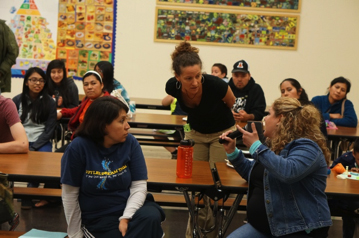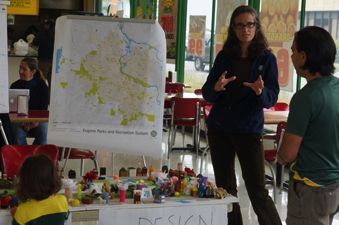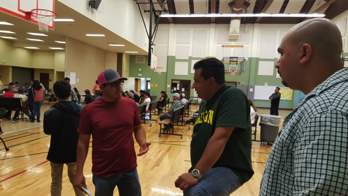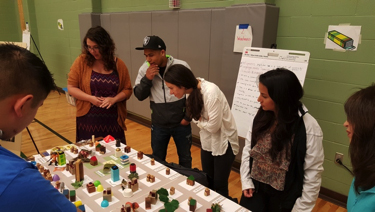Initial LCPP outreach and research in 2012 demonstrated that Eugene’s Latino community did not feel welcome in the city’s public spaces. The Eugene Parks department decided to address these issues through city park development, coinciding with their 20-Year Parks Update.
 In 2014, Eugene’s Parks department and the Office of Human Rights and Neighborhood Outreach teamed up with University of Oregon Professor Gerardo Sandoval’s Public Participation in Diverse Communities course. The goal: conduct community outreach and provide the City with information about how to create more inclusive and welcoming parks.
In 2014, Eugene’s Parks department and the Office of Human Rights and Neighborhood Outreach teamed up with University of Oregon Professor Gerardo Sandoval’s Public Participation in Diverse Communities course. The goal: conduct community outreach and provide the City with information about how to create more inclusive and welcoming parks.
This research took place in two phases. The first phase included broad community outreach, and the second, in-depth interviews with Latinos.
Phase One took place the spring of 2014. Dr. Sandoval and Mr. James Rojas, a city planner and public engagement specialist, trained Eugene City staff on the outreach methods, emphasizing the need to conduct the outreach out in the community. About 40 city staff attended. They represented various departments, including the police department, urban planning department, and the City departments of Parks and Recreation. City staff workshop participants, along with UO students, later conducted the actual outreach with UO students.
 Staff and students reached over 300 Latino residents by visiting Latino community businesses, cultural festivals, park sponsored community events, and after-school programs. Participants used objects and space to create answers to the basic question: What do you want to see in your parks?
Staff and students reached over 300 Latino residents by visiting Latino community businesses, cultural festivals, park sponsored community events, and after-school programs. Participants used objects and space to create answers to the basic question: What do you want to see in your parks?
Families and children shared a wide variety of input. Common themes included a desire for:
- Facilities suitable for multigenerational family and cultural occasions.
- Cultural representation within Parks, such as public art, bilingual signs, and bicultural community centers.
- Cross cultural education to showcase Eugene’s multicultural history and offerings.
The City of Eugene’s Human Rights and Neighborhood Involvement Office met with Parks and Recreation staff to determine what further information was needed to complete technical planning. In Phase Two, Professor Gerardo Sandoval, Dr. Anabel Lopez Salinas, and Master’s student Emily Fiocco worked with the City and the local nonprofit Downtown Languages to conduct in-depth community interviews.
The interviews gathered practical information for Park technical planning. They also revealed additional critical themes. Community members shared that being in a majority white space, including Eugene City Parks, is inherently uncomfortable, and that they often do not know how, nor feel empowered to ask for, help in emergency or uncomfortable situations. This research supports the City’s continuing efforts to build cross-cultural resources and capacity within government services.
The resulting reports and recommendations were presented to the City planners, who will incorporate these as possible into future Park development.
These results and reports support the City of Eugene’s current equity work and will help the Parks, Recreation, and other departments develop projects and set future equity-based goals.
Outreaching to the Latino Community: LCPP Outreach in Redmond, Oregon
 In the spring of 2016, Dr. Sandoval’s Public Participation in Diverse Communities course took its outreach efforts to Redmond, Oregon. Like the Medford outreach, this effort was a collaboration with the UO Sustainable City Year Program (SCY).
In the spring of 2016, Dr. Sandoval’s Public Participation in Diverse Communities course took its outreach efforts to Redmond, Oregon. Like the Medford outreach, this effort was a collaboration with the UO Sustainable City Year Program (SCY).
Objectives of this outreach were to:
- Improve communication between the Latino community and the City government in Redmond.
- Promote inclusive policies for city agencies in regards to the emerging Latino community.
- Identify some key issues the Latino community is facing in Redmond by using a participatory outreach approach.
Once again, Dr. Sandoval and James Rojas conducted a training for city staff on the participatory engagement outreach method. Uniquely, this outreach took place at Mexican Consulate mobile workshops in a local elementary school in Redmond. People and families getting documents were encouraged to interact with students and discuss their needs within the Redmond community.
 Students learned that a lack of access to government resources stunted the Latino community’s economic and daily life opportunities. Of note:
Students learned that a lack of access to government resources stunted the Latino community’s economic and daily life opportunities. Of note:
- A lack of bilingual services means that Latino community members have poor access to emergency services as well as basic city processes. Recording human rights complaints, accessing city permits, or even searching for City services is difficult for many.
- Without IDs, residents struggle to access housing or other economic opportunities, such as taking out loans for businesses or even getting business permits.
- Public transportation is a challenge for many of the Latino community’s work and daily needs.
Students also pointed to Redmond’s minimal Latino representation in their city government. There are few ongoing mechanisms for Latino community members’ voices to be heard in government. Outreach results concluded that it will be critical for the city to continue to work with Latino community members to build trust as well as develop integrated civic participation opportunities.
